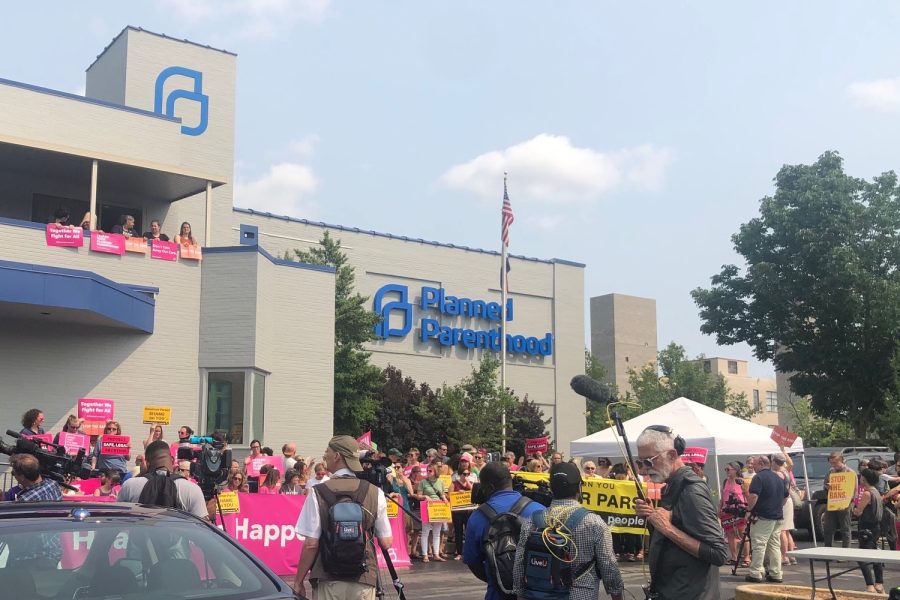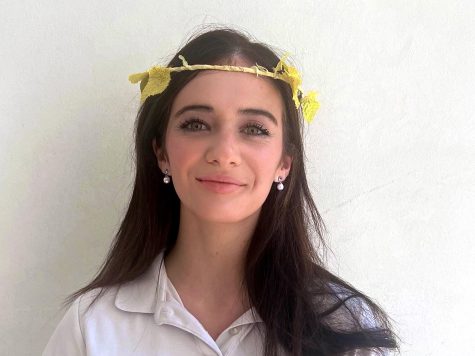Column: After Roe, Griswold?
Photo credit: Dinky Pictures
Pro-choice advocates gather outside of Missouri’s one Planned Parenthood. If Roe V. Wade is overturned, more than half of states will criminally prosecute abortion.
December 14, 2021
It seems Roe V. Wade will be overturned by June. Then, they’ll go after Griswold V. Connecticut, a precedent-setting case on the right to sexual privacy. We won’t be able to codify Roe if our congress is Republican. The future thereafter is hard to predict, but one thing is for certain: they’re after our bodies. And soon, they’ll have them.
I wonder why we call “The Handmaids Tale” “dystopian”?
“The Handmaid’s Tale,” written by Margaret Atwood is a novel set in a post-American society called Gilead. Women in the novel are properties of the government, to be used for pregnancy and are promptly disregarded. We follow Offred, a former student, mother and wife, who has become a handmaid — her life solely revolving around reproduction.
I think Offred’s description of the commanders taking over the United States is pertinent. Like in Gilead, first, we’ll be surprised and comforted, even united in our shock, then we’ll be afraid — numbed in our overwhelmed fear — but we must never be complacent.
“Nothing changes instantaneously,” Atwood wrote. “In a gradually heating bathtub you’d be boiled to death before you knew it.”
The commander’s irony is timely. Justice Amy Coney Barrett’s ignorance is practically comical in her clueless questioning of the necessity of abortion procedures.
If abortion rights advocates believed that “the consequences of parenting and the obligations of motherhood that flow from pregnancy [would harm women] why don’t the safe-haven laws take care of that problem?” Barrett said.
Barrett refers to the elusive adoption laws where a woman can leave a baby at a safe spot and isn’t responsible for her child. The actual reason why that doesn’t work is somehow lost in translation. Not all women are mentally, financially, physically or emotionally prepared for childbirth. Their struggle confusing to the face of privilege.
The resistance? Necessary.
How can you dissent to a process so characteristically undemocratic, unconstitutional and supposedly un-American? You protest and organize, as women did before, before contraption and before abortion.
Contraception has a possibility to be restricted, like abortion. Griswold v Connecticut in 1965 declared the use of contraception legal nationally and not subject to state-level restrictions. This determined a newfound right to privacy, one that was further protected by the declaration in Roe v Wade. Legal critics are arguing that Roe has the potential to bring down Griswold.
And, what next? With the right to privacy stripped of women, how restricted can our medical freedom become? Negative and positive liberties are still liberties.
“There is more than one kind of freedom,” Aunt Lydia, the primary antagonist in the novel, said to the handmaids. “Freedom to and freedom from. In the days of anarchy, it was freedom to. Now you are being given freedom from. Don’t underrate it.”
Now, we have freedom to. Freedom to use contraceptives, have sex, get pregnant, get an abortion, have a kid and the privacy to do so. We have the freedom to vote next November.
An alternative to all of this is codifying Roe and Griswold in legislation. But, that would require a sympathetic legislature. Something only achieved by more equal representation. Right now we have senate gridlock, meaning that it is challenging to pass legislation through Congress with exactly 50 democrats and 5o republicans. We need to change that with young people voting in 2022.
We must never have freedom from someone else. We don’t exist in someone else’s definition of womanhood, of feminity. We cannot.
“Nolite te bastardes carborundorum.”
Don’t let the bastards grind you down.









